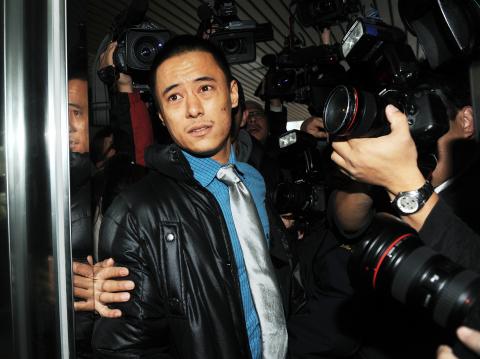A grandson of former president Chiang Ching-kuo (蔣經國) yesterday denied charges that he threatened to harm the Taipei American School (TAS), the students and members of its faculty.
During a hearing at the Shilin District Court in Taipei, Andrew Chiang (蔣友青) said he never had any intention of intimidating TAS or using illegal means to deal with a conflict he had with the school.
A former TAS student who transferred to another school in 2006, Andrew Chiang was indicted on Nov. 28 after allegedly making threatening comments against the school, especially its deputy superintendent, via Facebook and e-mail, between August and last month.

Photo: Lo Pei-der, Taipei Times
Prosecutors said an investigation showed that over the past two years, the 23-year-old had created loud noise disturbances several times on the school campus in protest against what he called unfair treatment by the school’s deputy superintendent while he was a student there.
On Aug. 21, he turned to Facebook to voice his anger, writing status updates in which he threatened to “slaughter” the school, prosecutors said.
He also sent e-mails from his home to the school’s deputy superintendent threatening to “spoil his life and throw him into jail,” they said.
In one of his Facebook posts, Andrew Chiang described himself as a terrorist and said he hated TAS and believes that the school killed his uncle.
Andrew Chiang’s lawyer said during the hearing that the Facebook posts were mostly expressions of emotions and that some were merely lyrics of pop songs.
Andrew Chiang did not directly mention the school in his posts or circulate the posts publicly, his lawyer said.
Andrew Chiang is the youngest of three sons of Chiang Hsiao-yung (蔣孝勇), who died of cancer in 1996 at the age of 48. Chiang Hsiao-yung was the youngest of three sons of Chiang Ching-kuo, who died in 1988 aged 77.

Alain Robert, known as the "French Spider-Man," praised Alex Honnold as exceptionally well-prepared after the US climber completed a free solo ascent of Taipei 101 yesterday. Robert said Honnold's ascent of the 508m-tall skyscraper in just more than one-and-a-half hours without using safety ropes or equipment was a remarkable achievement. "This is my life," he said in an interview conducted in French, adding that he liked the feeling of being "on the edge of danger." The 63-year-old Frenchman climbed Taipei 101 using ropes in December 2004, taking about four hours to reach the top. On a one-to-10 scale of difficulty, Robert said Taipei 101

Nipah virus infection is to be officially listed as a category 5 notifiable infectious disease in Taiwan in March, while clinical treatment guidelines are being formulated, the Centers for Disease Control (CDC) said yesterday. With Nipah infections being reported in other countries and considering its relatively high fatality rate, the centers on Jan. 16 announced that it would be listed as a notifiable infectious disease to bolster the nation’s systematic early warning system and increase public awareness, the CDC said. Bangladesh reported four fatal cases last year in separate districts, with three linked to raw date palm sap consumption, CDC Epidemic Intelligence

US climber Alex Honnold left Taiwan this morning a day after completing a free-solo ascent of Taipei 101, a feat that drew cheers from onlookers and gained widespread international attention. Honnold yesterday scaled the 101-story skyscraper without a rope or safety harness. The climb — the highest urban free-solo ascent ever attempted — took just more than 90 minutes and was streamed live on Netflix. It was covered by major international news outlets including CNN, the New York Times, the Guardian and the Wall Street Journal. As Honnold prepared to leave Taiwan today, he attracted a crowd when he and his wife, Sanni,

Taiwanese and US defense groups are collaborating to introduce deployable, semi-autonomous manufacturing systems for drones and components in a boost to the nation’s supply chain resilience. Taiwan’s G-Tech Optroelectronics Corp subsidiary GTOC and the US’ Aerkomm Inc on Friday announced an agreement with fellow US-based Firestorm Lab to adopt the latter’s xCell, a technology featuring 3D printers fitted in 6.1m container units. The systems enable aerial platforms and parts to be produced in high volumes from dispersed nodes capable of rapid redeployment, to minimize the risk of enemy strikes and to meet field requirements, they said. Firestorm chief technology officer Ian Muceus said